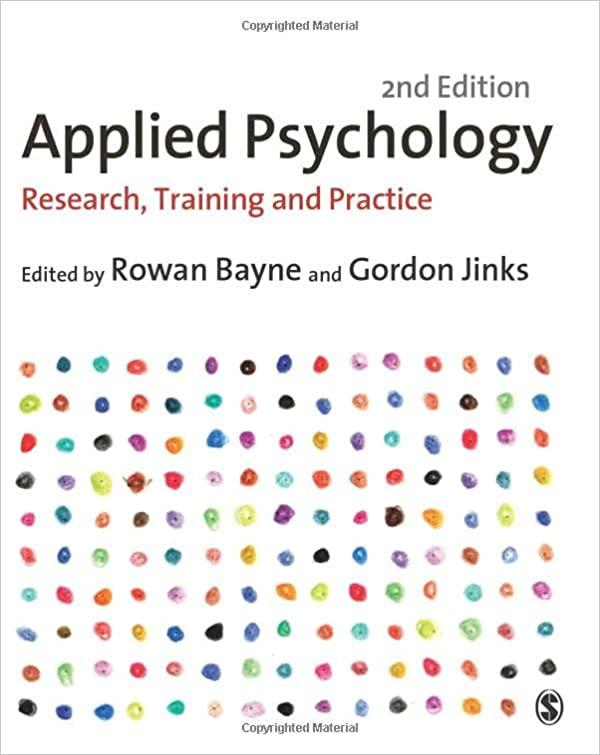Question
Respond respectfully and substantively on the response toward the mental health topic: Alcoholism, below. Provide detailed feedback. The inability to control drinking due to both
Respond respectfully and substantively on the response toward the mental health topic: "Alcoholism", below.
Provide detailed feedback.
The inability to control drinking due to both a physical and emotional dependence on alcohol. Alcoholism is colloquial term used to refer to the different types of alcohol use disorder (AUD) which is considered to be a brain disorder caused by alcohol misuse.
The treatment for AUD involves evidence-based treatment with behavioral therapies, mutual-support groups, sometimes with medication as well. A person is at higher risk for developing AUD if they start drinking at an early age, have a family history of alcoholism/ problems, if they have mental health conditions along with a history of trauma, and if they binge drink(Department of Health and Human Services, January 2020). Overuse and misuse of alcohol significantly increases a persons risk for developing AUD of any severity.
In relation to aging; the consumption of alcohol can worsen pre-existing health issues and have adverse reactions to various medications. As we grow older alcohol can have a stronger effect on the body from the same amount of alcohol, which puts those who do drink at more risk for accidents than those who do not. Alcohol issues can also disguise themselves as conditions related to drinking making these issues harder to distinguish as being from alcohol- some examples would include shaky hands or a loss of balance.
Of those who develop a harmful reliance on alcohol in their later years of life it's most commonly from feelings of loneliness, boredom, anxiety or depression- which can e caused by various life changes such as loss, moving, health issues and so on. Of these feelings, depression is the most common factor that aligns with over drinking (Department of Health and Human Services, July 2022). Overdrinking is dangerous at any age but the risks increase as you grow older, AUD can cause harm not only to your physical health but also to your mental health and put a strain on your relationships be it friends or family. Binge drinking can cause you to become violent, develop chronic diseases or cancer, binge drinking can even cause your children to develop diseases or even die (if you were drinking while pregnant).
Statistically speaking, according to the CDC; the age group who is reported to most commonly binge drink is adults aged 18-34 years, reaching up to 25% of the U.S population of that age group, and out of that group it is majoritally men. Interestingly enough there is a higher percentage of those who excessively drink in high school (14%) than there is of those aged 65 and older (65%), showing that after 34 there is a gradual decrease in the amount of people who binge drink, though the highest amount of alcohol consumption is from those 45 years and older, which would point to those who are binge drinking above the age of 44 are drinking in more volume than those who are younger even though there are fewer reported binge drinkers of this age.
There is no one cure for Alcoholism, though there are many resources that those who struggle with alcoholism can reach out to and receive therapy, support, and community. Some of these resources include the SAMHSA national helpline, Alcoholics anonymous groups (AA), Rehab centers, Therapists, doctors, and more. People who have issues with alcoholism at any age have the opportunity to receive help at any time and though there are struggles along the way they can recover and become sober once more and stop before their health declines or any harm comes to them and those surrounding them.
U.S. Department of Health and Human Services. (2020, January). Understanding alcohol use disorder. National Institute on Alcohol Abuse and Alcoholism. https://www.niaaa.nih.gov/publications/brochures-and-fact-sheets/understanding-alcohol-use-disorderLinks to an external site.
U.S. Department of Health and Human Services. (2022, July 19). Facts about aging and Alcohol. National Institute on Aging. https://www.nia.nih.gov/health/alcohol-misuse-or-alcohol-use-disorder/facts-about-aging-and-alcoholLinks to an external site.
Centers for Disease Control and Prevention. (2024, February 29). Binge drinking. Centers for Disease Control and Prevention. https://www.cdc.gov/alcohol/fact-sheets/binge-drinking.htmLinks to an external site.
Samhsa's national helpline. SAMHSA. (2023b, September 6). https://www.samhsa.gov/find-help/national-helplineLinks to an external site.
Step by Step Solution
There are 3 Steps involved in it
Step: 1

Get Instant Access to Expert-Tailored Solutions
See step-by-step solutions with expert insights and AI powered tools for academic success
Step: 2

Step: 3

Ace Your Homework with AI
Get the answers you need in no time with our AI-driven, step-by-step assistance
Get Started


